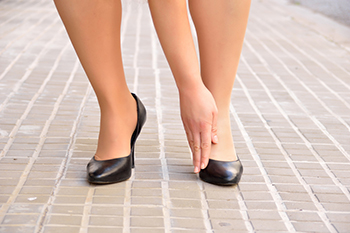
When it comes to high heels, opinions vary widely. Some find them elegant and empowering, while others associate them with discomfort. If you belong to the latter group, it might be because you have not discovered the right heel height for your feet. Comfort varies from person to person, depending on foot shape, shoe type, and experience with heels. The average heel height is around 3 inches, falling into the mid-height range. Low heels are 1 to 2 inches, while high heels are 3 to 4 inches. Finding your ideal heel height may require some experimentation. It's a good idea to prioritize foot health and alternate between heels and flats. To measure heel height, place the shoe on a flat surface and measure from the bottom of the heel to where it connects to the shoe. If you would like to wear heels, it is suggested that you make an appointment with a podiatrist to get advice on wearing this type of shoe for your particular feet and prioritizing style and comfort.
High heels have a history of causing foot and ankle problems. If you have any concerns about your feet or ankles, contact Arthur Segall, Jr., DPM from Segall Foot and Ankle. Our doctor can provide the care you need to keep you pain-free and on your feet.
Effects of High Heels on the Feet
High heels are popular shoes among women because of their many styles and societal appeal. Despite this, high heels can still cause many health problems if worn too frequently.
Which Parts of My Body Will Be Affected by High Heels?
- Ankle Joints
- Achilles Tendon – May shorten and stiffen with prolonged wear
- Balls of the Feet
- Knees – Heels cause the knees to bend constantly, creating stress on them
- Back – They decrease the spine’s ability to absorb shock, which may lead to back pain. The vertebrae of the lower back may compress.
What Kinds of Foot Problems Can Develop from Wearing High Heels?
- Corns
- Calluses
- Hammertoe
- Bunions
- Morton’s Neuroma
- Plantar Fasciitis
How Can I Still Wear High Heels and Maintain Foot Health?
If you want to wear high heeled shoes, make sure that you are not wearing them every day, as this will help prevent long term physical problems. Try wearing thicker heels as opposed to stilettos to distribute weight more evenly across the feet. Always make sure you are wearing the proper shoes for the right occasion, such as sneakers for exercising. If you walk to work, try carrying your heels with you and changing into them once you arrive at work. Adding inserts to your heels can help cushion your feet and absorb shock. Full foot inserts or metatarsal pads are available.
If you have any questions please feel free to contact our offices located in Plantation, FL Ft. Lauderdale, F . We offer the newest diagnostic and treatment technologies for all your foot and ankle needs.
